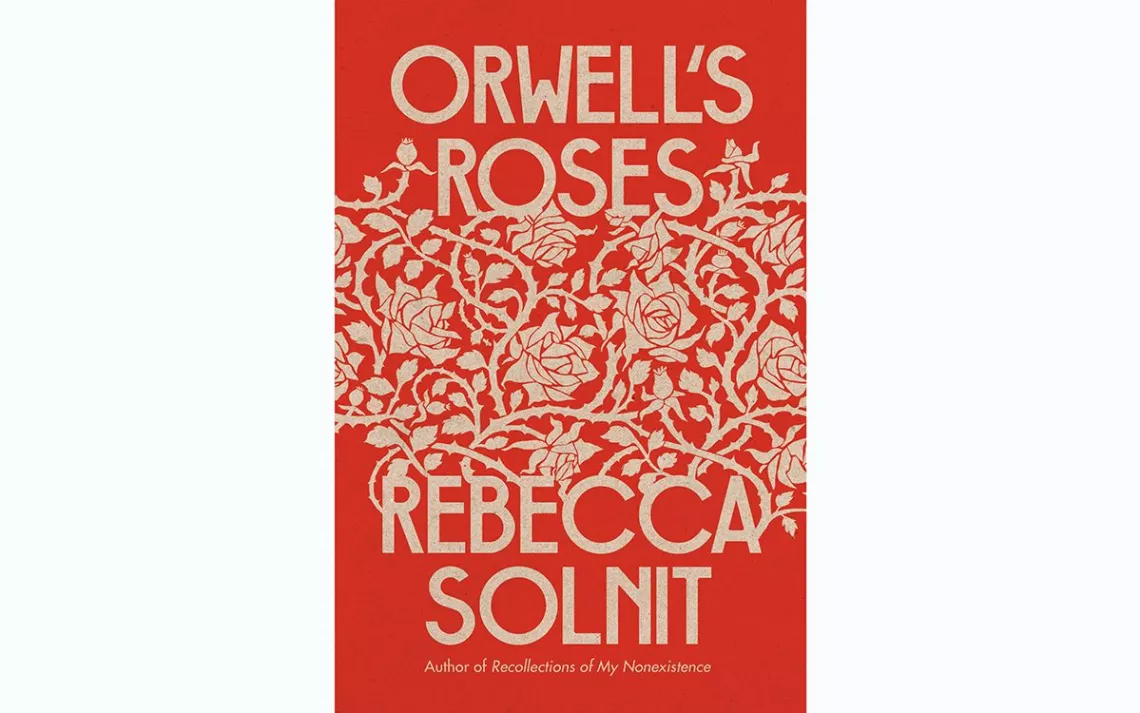Was George Orwell’s Political Writing Rooted in Love for the Natural World?
Inside Rebecca Solnit’s new book, “Orwell’s Roses”

"In the spring of 1936, a writer planted roses."
It is a simple yet enticing first line. Perhaps not as memorable as 1984’s "It was a bright cold day in April, and the clocks were striking thirteen." But few opening sentences are.
One does not immediately associate author George Orwell with horticulture, but we're not all as insightful and perceptive as Rebecca Solnit, author of Remembrance of My Nonexistence,The Faraway Nearby, Men Explain Things to Me, and nearly 20 other books.
That's why it's a blessing we have her to give us Orwell's Roses, out today from Viking. The work traces the connections between Eric Arthur Blair's (a.k.a. George Orwell's) rented cottage and garden in Wallington, England, and his experiences as a political journalist, antifascist, and world-famous novelist.
No commonplace biography, Orwell's Roses is rather "a series of forays from one starting point, that gesture whereby one writer planted several roses." The book starts with Solnit's own deep interest in trees and her memory of one of Orwell's more lyrical essays, "A Good Word for the Vicar of Bray," in which he mentions that he planted five apple trees in 1936 in Wallington. The image of the intense anti-totalitarian pottering around in the dirt charmed Solnit, so during a grueling English book tour, she and a friend stopped by the cottage formerly inhabited by Orwell.
The fruit trees were gone, but two rose bushes were in bloom. Solnit writes, "They were exuberantly alive, these allegedly octogenarian roses, living things planted by the living hand (and shovel work) of someone gone for most of their lifetime."

Rebecca Solnit © Trent Davis Bailey
A formidable political and nature writer in her own right, Solnit holds back before launching into the biographical details of Orwell. Rather, she turns her attention to the roles that flowers—roses in particular—play in biology and popular culture. Often viewed as "dainty, trivial, dispensable," flowers have been on Earth for two hundred million years or so and are crucial to the survival of humankind. Roses inspire songs ("La Vie en Rose," "A Good Year for the Roses"), fairy tales ("Rose Red"), and of course, English wars.
After introducing readers to Orwell's garden, Solnit provides the basic facts of Orwell's life and career. Born in northern India in 1903 but having returned to England at an early age, he spent his boyhood miserable in elite public schools, and eventually earned a scholarship to Eton. After graduation, he served five years in Burma in Britain's imperial police force. Suffering from a respiratory disease not helped by the Burmese climate, he returned to Europe to pursue what seemed to be a downwardly mobile literary career, living in poverty in England and France. The sojourn resulted in his first book, Down and Out in Paris and London.
The impressively prolific Orwell would go on to write novels (Keep the Aspidistra Flying), essays ("A Hanging"), journalism ("Homage to Catalonia"), and diary entries. On the domestic front, he married Eileen O'Shaughnessy, and they adopted a son they called Richard. Orwell's second-most familiar work, Animal Farm, was rejected by T.S. Eliot and a host of other editors but eventually found a publisher and became high school English required reading. Orwell spent his last years working for the BBC, enjoying the critical and popular success of 1984 and building on the Scottish Isle of Jura a garden—verging on a farm—with "livestock, crops, fruit trees, a tractor—and a lot of flowers." In his lungs, meanwhile, sprouted pneumonia and tuberculosis, which killed him at age 46.
Solnit lets her readers glimpse a side of Orwell rarely noted by other commentators. Count the references in his work to plants, farming, flowers, and nature, Solnit writes, and the pattern becomes more visible. Orwell's political writing is grounded in his appreciation for the natural world. Even 1984 reveals a yearning for a Golden Country, Solnit notes, "with its light, trees, meadows, birdsong, and sense of freedom and release."
Orwell's roses lead Solnit to Tina Modotti's "Roses, Mexico,” what may be the most famous floral photograph in history. They also lead to a short discussion of the term, "bread and roses," used as a political rallying cry to demand both physical and artistic sustenance—which leads Solnit back to Orwell's essay "Some Thoughts on the Common Toad," in which he celebrates "the intangible, ordinary pleasures, the joy available in the here and now."
Although the elegance and urgency of her prose counts for much of the pleasure of Orwell's Roses, it is the way in which Solnit connects disparate elements of her subjects that distinguishes the book. One never knows who or what might show up next. The child laborers in the coal mines remind Solnit of Ursula K. Le Guin's story "Those Who Walk Away From Omelas" and its depiction of a horrifically scapegoated child. Solnit recounts how imperialism influenced Jamaica Kincaid, so that when the Antigua-born author wrote of plants or gardening she was reminded of displacement, "people uprooted, culture imposed, plants transplanted and transformed."
Solnit details Orwell's critiquing of Stalin at a time when many on the Left were reluctant to do so. Solnit writes, "Stalin was surely Orwell's principal muse, if not as a personality, then as the figure at the center of a terrifying authoritarianism wreathed in lies."
If Orwell planted roses, Stalin planted lemons, which froze in the Crimea—victims forced to endure untenable temperatures at the whim of a dictator. Solnit also delves into the crackpot Lamarck theories of genetics, or “soft genetics,” and how they tragically led to widespread famine in the early 20th century when crops didn't grow as expected.
A socialist at a time when people actually understood what the word meant, Orwell gained firsthand knowledge of the events he wrote about. He crawled into mines to observe the backbreaking work it took to keep the Industrial Revolution running. He fought against Franco in the Spanish Civil War and endured the bombing of London during the Second World War.
Solnit doesn't descend into any coal mines, but she isn't averse to conducting research on the road. To investigate the origins of most of the mass-produced roses that arrive in the US, Solnit travels to Colombia, the world's second-largest exporter of flowers. She visits vast greenhouses filled with thousands upon thousands of mostly unscented roses, their parts strewn across the floor and heaped in piles, amounting to millions of cut flowers packed up in carbon-burning aircraft and flown to Miami to be shipped throughout the US, while rose workers complain of exhaustion, stress injuries, and chemical contamination.
The workers have a slogan: "The lovers get the roses, but we workers get the thorns." Management has its own slogans, some printed on the workers' uniforms such as, "Sunshine Bouquet, the best place to be happy."
It's hard not to see the anonymous copywriter's prose as more than a little bit creepy. Solnit writes, "The slogans were often in that genre often called Orwellian, which is to say they were ominous in their insincerity and unsettling in their contradictions and their imposition on workers unlikely to agree whole-heartedly with them or to be wearing them by choice."
In the end, everything comes down to language. Orwell hated sloppy language, seeing it as a tool of totalitarians, a means of control. Readers most likely know what “Orwellian” means without explanation, but they may recognize only a slice of it.
Solnit's penultimate chapter is an assessment of her rereading of 1984, one likely to send many readers back to the text for a better understanding of the forces that combined to create a dystopian masterpiece. The final chapter finds Solnit in East Anglia on the banks of the River Orwell, with a companion who wonders whether "Orwellian" should perhaps mean "something other than ominous, corrupt, sinister, deceitful, a hypocrisy or dishonesty so destructive that it is an assault on truth and thought and rights."
Based on Solnit's accounting of Orwell's deeply held appreciation of the natural world, it is time to reassess the connotation of the adjective to something open to beauty in its many guises, committed to the truth, and protective of gardens and farms and forests, large and small.
With precise control and boundless curiosity, Solnit has produced a work of biography and nature writing that makes readers see the enduring and the ephemeral in entirely new ways, free from cliché and obfuscation.
 The Magazine of The Sierra Club
The Magazine of The Sierra Club



